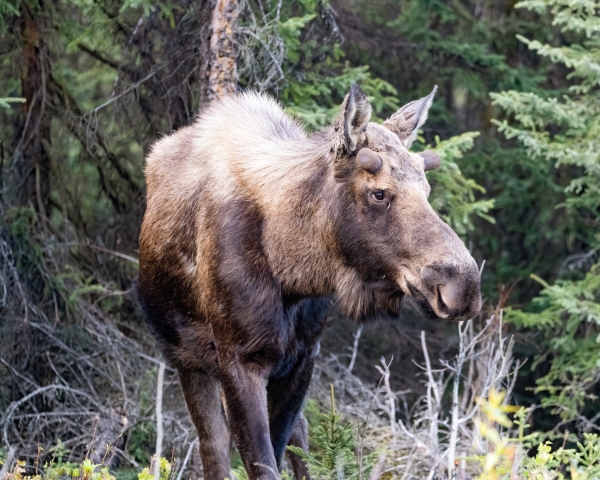
Where to Look
Alpine Tundra: In the mountains above treeline, low growing plants provide food for Dall sheep, caribou, and marmots. Golden eagles hunt small mammals from the air. Brown bears feast on berries in late summer.
Boreal Forest: Spruce and hardwoods such as birch, aspen, and cottonwood are home to songbirds, spruce grouse, red squirrels, owls, lynx, moose, and black bear.
Waterbodies: Bogs, marshes, and muskeg are nesting areas for migratory waterfowl and shorebirds. Caribou and moose eat dwarf birch and willows. Bears can be seen in these areas hunting for moose calves in spring. Areas around rivers, lakes, and ponds are home to beaver, muskrat, loons, trumpeter swans, and spawning salmon. Trout and salmon, attract bald eagles, bears, and river otters
If You Encounter a Moose
- Move away! Maintain a space of 75 feet or more between yourself and a moose.
- Watch for body language. If the moose lowers its head and ears, and the hair on its back and neck stands up, back off.
- If a moose charges, retreat behind a large tree or rock. Most moose charges are bluffs and getting behind something solid offers important protection from their sharp, powerful hooves.
- Remember, keeping your distance from moose is the best way to avoid a negative encounter.
Traveling in Bear Country
- Black and brown bears are found throughout the refuge. Be alert and use your senses to evaluate fresh bear sign such as tracks, scat, claw marks, and strong scents.
- Make noise to avoid surprising a bear. Be especially careful along noisy streams, in thick brush, and where visibility is poor.
- If you see a bear—stay calm. If the bear does not notice you, quietly leave the area from the same direction you arrived. Keep your eyes on the bear.
- If a bear does notice you, face the bear, wave your arms, and talk to it calmly. Try to appear larger by standing close to your group. If a bear approaches you, stand still. Do not run!
- If a bear attacks, fall to the ground and play dead. Lie flat on your stomach, or curl up in a ball with your hands behind your head. Keep your pack on.
- read more
